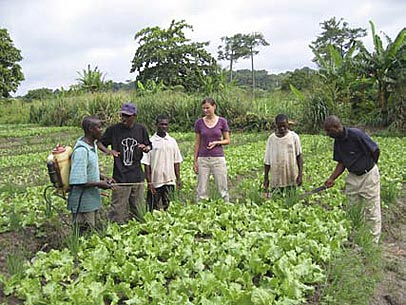Casestudy 25Ghana
Learning from rapid urban growth
and reflection in Kumasi
- description
- further information

© IWMI
There is great potential for recycling nutrients from organic city waste for use in agriculture. In researching the potential for the utilization of techniques to this end, early estimates for the city of Kumasi, Ghana, by the Urban Agriculture Group of the International Water Management Institute indicated that only 10 per cent of the major plant nutrients entering the city were being reclaimed and attempts to apply food waste recycling were problematic due to numerous technical, marketing and institutional problems in composting stations.
To help address this problem, IWMI undertook to analyse nutrient flows across the rural–urban interface and to develop recycling strategies to close the nutrient cycle and preserve the quality of the urban environment. Initial phases of IWMI’s work revealed that:
- there was sufficient organic waste of good quality for composting as well as options for successful community involvement in the operation of compost stations;
- the willingness to pay of the majority of interested farmers was too low to cover the running costs of the compost stations. Because only those farmers with higher than average means and willingness to pay could afford compost, it was estimated that the production limit (and nutrient recycling) would be reduced to about 10 per cent of the total annual compost demand unless subsidies were provided;
- those who could afford the compost were mostly located in the peri-urban area. Thus, subsidies could best be justified if compost production took place in peri-urban towns not yet connected to urban waste collection. Here, composting would be closer to the farmers and local waste dumps would be given significant relief, so funds otherwise spent on the transport of waste would be saved.
Before trying to develop decision support on composting and exploring institutional components to recycling strategies in subsequent stages of its work, IWMI chose to study existing compost stations in the West African subregion to learn from the experiences of other projects. Very few compost stations were found to be even close to levels that could be considered sustainable. What was more, IWMI discovered that institutionally and financially, the compost stations were not viable. At this point, project leaders realized that their technical approach had inaccurately addressed challenges of urbanization and that the mainly agricultural scope of research being done was too narrow.
To improve its capacity to tackle a wider approach, IWMI strengthened its team, forming alliances with 15 different university departments of three national universities. Over 100 students were incorporated into the research and joined IWMI seminars and field interviews. The result was a significant rise in the levels of monitoring and feedback coming back to the project coordinating unit and an increase in the project’s ability to react quickly to new information.
In addition, by adding a vast field of input to their work, IWMI augmented both the technical and non-technical skills available to it. Now part of the team were researchers qualified in planning, institutional analysis, economics, engineering, participatory research and environmental science. Through its partnerships, IWMI became increasingly adaptable and open to learn in its approach.
Continuing today, IWMI’s work in Ghana maintains flexibility and is strengthened by curiosity and an organizational framework that incorporates new ideas easily. While its focus remains on technical innovations in recycling solid and liquid urban waste, IWMI’s incorporation of contextually based and institutionally aware research into its work has resulted in the greater relevance and perspective of its findings. Despite having faced numerous barriers in its work, IWMI attributes its continued progress to its ability to think creatively and respond to change.Go back to case studies listing
P.M.B. CT 112
Accra, Ghana
